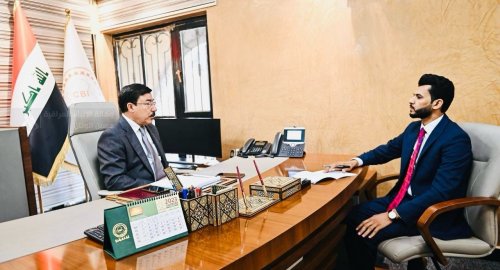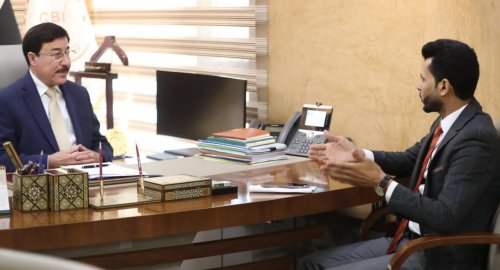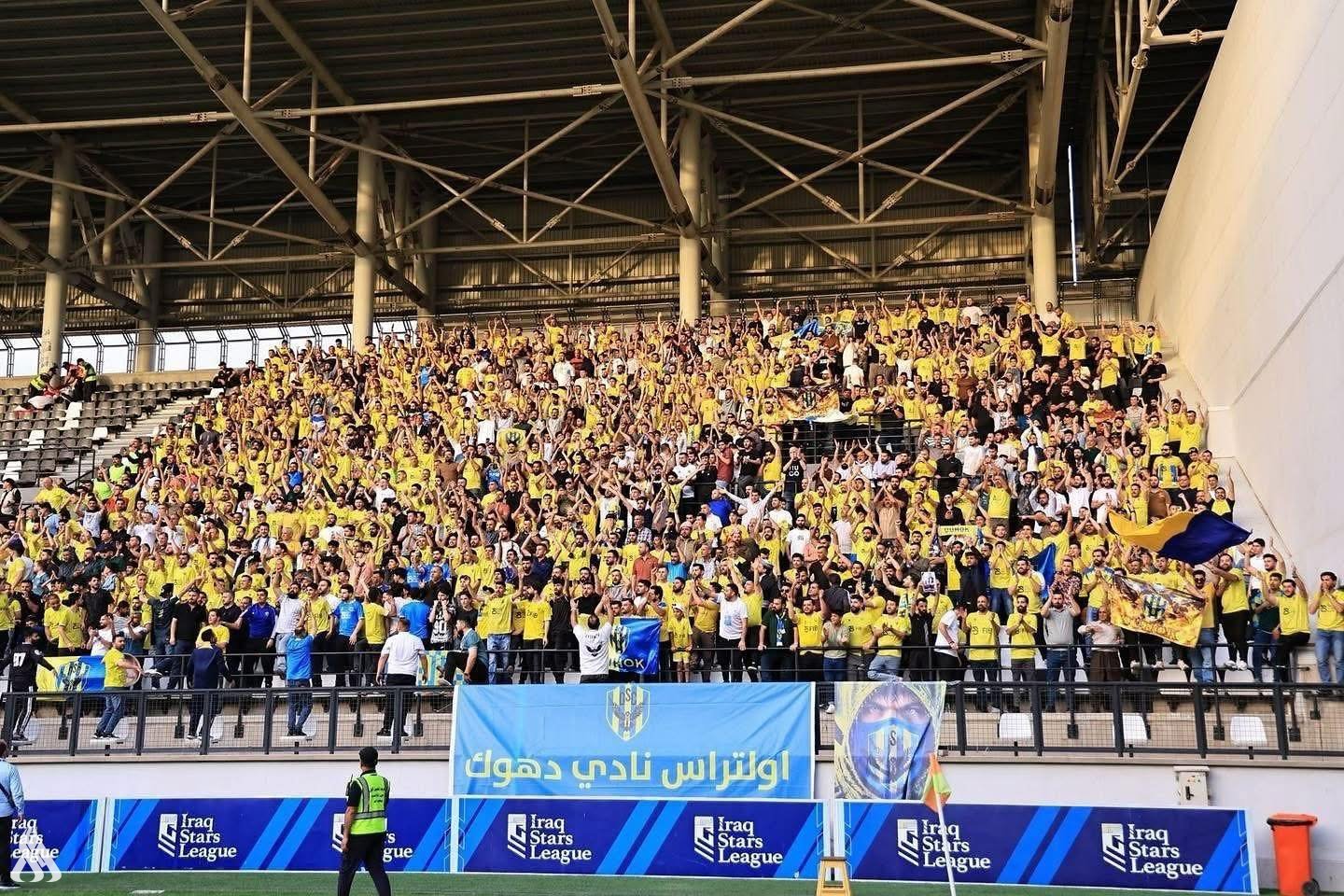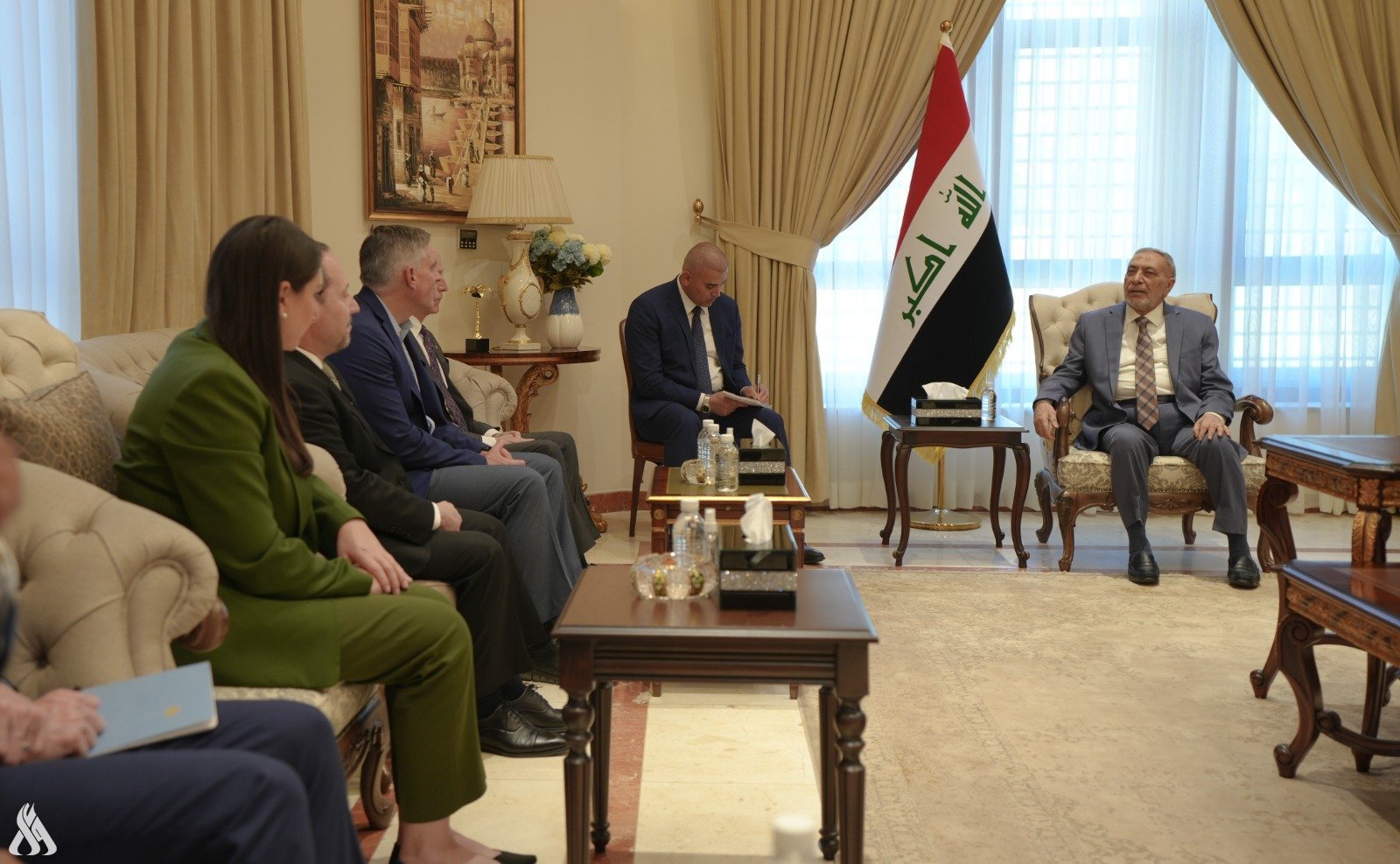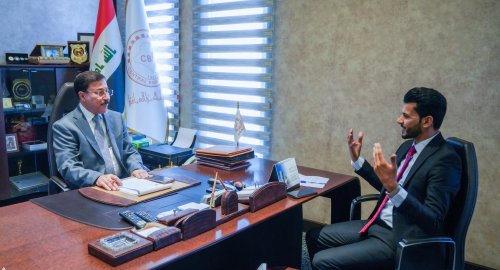
INA discusses exchange rates files, foreign transfers, and housing initiatives with the CBI governor

- 9-08-2024, 07:00
Baghdad-INA
The Governor of the Central Bank of Iraq (CBI), Ali Al-Alaq discussed on Wednesday a new mechanism to regulate transfer operations for small traders, revealed an upcoming meeting in New York to address the issue of sanctioned banks, and noted that the official exchange rate supports foreign trade that meets citizens' needs. He also confirmed the government's intention to increase the capital of the Real Estate Bank and the Housing Fund.
Financial Situation in Iraq
In an interview with the Iraqi News Agency (INA), the Governor stated: "There are external and internal challenges, but overall, the financial situation in Iraq is progressing as planned in the state budget."
He emphasized that "there is high coordination between the Central Bank, the Prime Minister, and the Ministry of Finance to ensure financial stability and sustainability."
Al-Alaq added, "We are currently working closely, almost daily, with the Ministry of Finance to ensure the financial plan outlined in the general budget is executed, covering its goals, programs, and existing needs."
He pointed out that "for the first time, under the new budget and financial management laws, the allocations for provinces and ministries are being rolled over, providing extensive financial coverage. For the first time, the ministries and provinces have substantial balances, enabling them to effectively fulfil their roles."
Foreign Trading
The Governor stated, "The Central Bank is undergoing a major transformation in reorganizing foreign trade management to achieve multiple goals simultaneously. One key objective is to ensure transparency in external transfer operations, tracking everything from the transfer process to the final recipient and source, using all relevant data, documents, and information to verify accuracy."
He also explained that "this is a first in Iraq’s history, with international auditing bodies involved in verifying the information before it reaches the execution stage. Transfers proceed only if they meet all local and international standards, including anti-money laundering and counter-terrorism financing laws. If there is any shortfall, error, or suspicion, the transfer is immediately rejected and returned."
The CBI governor also affirmed that "the previous audit process was conducted but with a subsequent review, and audits could remain for years. Now, the process does not proceed unless it is sound in its aspects, parties, documentation, reinforcements, and the facts on which it is based," explaining that "any transition process needs time and understanding between all parties and acceptance."
Al-Alaq highlighted that large and medium-sized importing companies have already adopted the new system, ensuring a smooth flow of their imports, which is critical for maintaining market stability. However, some small traders remain reluctant, either avoiding the system due to concerns about tax and customs obligations or hesitating because of the procedural requirements for opening accounts.
"Our priority in the current and upcoming phases is to integrate all market participants into the proper, regulated channels," he explained, adding that the exclusion of small traders from this system exerts upward pressure on the dollar, contributing to its rise.
He also mentioned ongoing efforts to develop solutions in collaboration with international and financial institutions to better regulate the operations of small traders. "We held a meeting yesterday to further these discussions, and while progress is being made, additional time is required to fully implement the changes."
International Currencies Suspension
Regarding other currencies, the Central Bank Governor confirmed that the bank had opened channels for the Chinese Yuan, Turkish lira, Indian Rupee, and UAE Dirham, which play a significant role in foreign trade.
He noted that there was a temporary halt in these operations due to the implementation of a new regulatory framework aimed at ensuring sufficient oversight.
"We discovered that the previous system allowed some misuse of these channels, such as transactions involving fictitious exporters or the transfer of funds between different countries," he explained. "A new auditing mechanism, carried out by an international firm, has been established, and the process is now ready to resume."
He added that commercial foreign currency transfers are subject to review by the specialized international firm, which acts as an intermediary between Iraqi banks and correspondent banks.
This ensures that correspondent banks are confident in the validity and thorough auditing of these transactions.
He also highlighted that while some Iraqi banks have established relations with correspondent banks, others have not yet secured internationally recognized correspondents, leading to delays.
The Central Bank has consistently urged these banks to establish such relationships, as an Iraqi bank without international correspondents operates as a local bank and cannot engage globally.
The Governor emphasized that Iraqi banks, after recognizing the importance of these relationships, have begun to approach correspondent banks. The Central Bank is actively supporting and facilitating this effort.
Discrepancy between Market and Official Exchange Rates
The Central Bank Governor stated that, under the new regulations for external transfers, it is important to consider the actual rate at which the Central Bank sells over $250 million daily at the official exchange rate.
This indicates that the bank fully supports foreign trade, which helps explain the lack of inflation and price increases, as well as the fulfillment of legitimate consumer needs.
The parallel market, he noted, serves those who prefer not to engage in official channels, often involving illegal activities such as drug trafficking, human trafficking, or the handling of corrupt funds.
"The Prime Minister has made it clear that we do not provide official dollars for illegal activities," he emphasized.
The Governor questioned, "Why would anyone choose to buy dollars at a higher rate when the official rate is available, unless they have an unlawful or non-compliant intention?"
He highlighted that fluctuations in the dollar's market price do not provide a true reflection of the economic situation; rather, attention should be paid to the volume and value of the Central Bank's sales at the official rate, which adequately meet various legitimate demands.
Decrease in Inflation
The Governor pointed out that "the primary goal of the Central Bank is to maintain the general price level and reduce inflation, which should be the benchmark for the success of monetary policy.
The bank has successfully controlled inflation, which is now significantly lower compared to other countries and previous years, and remains within the targeted range. This indicates that the foreign trade, which Iraq relies on to meet the needs of its citizens, is being covered at the official exchange rate."
Cooperation with the U.S. Treasury
The Governor noted that "there has been significant praise in all meetings with international organizations, including the International Monetary Fund, the Federal Reserve, and the U.S. Treasury, regarding the transformations, management, and organization of external transfer processes at the Central Bank of Iraq."
He explained that "the U.S. Treasury Deputy Secretary emphasized in his meeting with the Prime Minister the importance of celebrating the achievements made in external transfers and the progress the Central Bank of Iraq has made, including the electronic platform that faced various challenges before stabilizing. Previously, the rejection rate for transactions reached as high as 80%, whereas it now stands at less than 5%."
He affirmed that "the current platform places a burden on the Central Bank and external parties, including the Federal Reserve. It is not the role of central banks to delve into the details of transfer operations. Therefore, we have gradually transitioned from the electronic platform to establishing direct relationships between Iraqi banks and correspondent banks, bypassing the need for execution through the Central Bank or the Federal Reserve."
He added that "we have achieved about 85% completion of external transfers without involving the U.S. Federal Reserve, which international organizations have recognized as a significant milestone."
He also stated that "we plan to reach 100% by the end of the year for external transfers between Iraqi banks and correspondent banks without going through the U.S. Federal Reserve. At that point, the Central Bank's role will be more natural, focusing on oversight, supervision, and monitoring the progress of operations without getting involved in the daily detailed execution procedures."
Upcoming Meeting in New York
The Governor stated that "meetings will be held with the Federal Reserve and the U.S. Treasury Department at the end of August to review all aspects related to external transfer operations and discuss sanctions on certain banks."
He noted that "what was expressed in previous discussions and interpretations during the last meeting in Washington was not, in fact, the quarterly meeting, nor did we meet with the Federal Reserve. Instead, we attended other meetings, including a visit to the U.S. Treasury Deputy Secretary, which was a routine encounter that addressed general matters and confirmed the Central Bank's success in leading its initiatives, including external transfers and the cash sale of dollars, which have also been developed to facilitate dollar access for travelers."
He explained that "previous processes for granting dollars to travellers faced many challenges, as speculators attempted to exploit these transactions in various ways, negatively impacting the dollar and the use of other individuals' passports."
He added that "the new mechanism effectively eliminates these practices, as dollars will only be issued to travellers after their departure has been stamped."
He clarified that "the process began a few days ago and is generally proceeding smoothly, although with some observations. Teams are present at airports to monitor the process and address any obstacles. This will ensure we achieve our goal of reaching genuine travellers, starting in Baghdad, then Basra, and Najaf, and now we are working on opening access at the airports in Erbil, Sulaymaniyah, and Kirkuk."
Lifting Restrictions on Banks
Governor Al-Alaq explained that "lifting restrictions on certain banks is a priority for the Central Bank, which is close to resolving the issues and implementing appropriate solutions to ensure the stability and growth of the banking sector."
He further mentioned that "several meetings have been held regarding the lifting of restrictions on certain banks, through which we have developed a plan that will ensure stable outcomes for the future."
"The plan for reforming and lifting restrictions on banks that are subject to restrictions includes two aspects," he said. "The first relates to conducting an audit of previous operations that raised suspicions through an independent external audit office; some of these audits have been completed, while we are waiting for others to be finalized to get a comprehensive picture and categorize the nature of these issues and how to address them."
He pointed out that "the second component of the plan has received international praise, as the Central Bank has contracted with an international consulting firm to develop a future strategy for the banking sector, assess the magnitude of the existing issues, place them within an independent framework, prevent their recurrence, and restructure the banking sector."
He emphasized that this plan is based on assessing the size of the banking sector in Iraq, determining the appropriate number of banks needed, evaluating their scale and activities, and establishing the rules, policies, and procedures they should adopt to ensure stability and acceptance both locally and internationally.
Al-Alaq clarified that "the Central Bank has initiated this plan through the consulting firm, and it will take time to define the scope of work and the objectives we aim to achieve."
He also mentioned that alongside this plan, another plan is underway to reform the public banking sector.
Al-Alaq noted that "the Prime Minister holds monthly meetings with the international consulting firm responsible for reforming the public banking sector."
He added that "the Prime Minister's continuous follow-up has given momentum to the reform processes, whether at the governmental or private levels and that the future of these banks will be determined on clear and well-considered foundations, rather than through patchwork solutions or uncalculated reactions."
Al-Alaq affirmed that he is committed to establishing a genuinely stable banking sector that aligns with the national economy's needs, where certain banks no longer remain marginal entities without contributing significant value to the Iraqi economy, and that they gain external acceptance by adhering to international policies, procedures, and standards.
Al-Alaq also clarified that "the Central Bank has not set a specific quota for foreign currency transfers for banks; they are free to attract as many foreign exchange transactions as they can. The Central Bank does not interfere with customer choices, and banks undertaking this process rely on their ability to attract clients."
He highlighted the Central Bank's efforts to strengthen and support the role of the Trade Bank of Iraq, enabling it to play a larger role in foreign trade activities while denying any discussion of reconsidering the exchange rate issue.
Housing Initiative
The Governor of the Central Bank disclosed a government directive, now included in the budget, to increase the capital allocated to support the housing sector through the Real Estate Bank and the Housing Fund.
Governor Al-Alaq stated, "While financing the housing sector traditionally falls under the purview of banks, particularly the Real Estate Bank and the Housing Fund, the Central Bank's initiatives have played an exceptional role in addressing the housing deficit."
He further explained, "The Central Bank recognized the necessity of increasing the capital of the Real Estate Bank and the Housing Fund to enable them to meet their responsibilities. The current capital levels are insufficient to address the significant and widespread needs for housing finance."
Governor Al-Alaq noted, "It was anticipated that the government would augment the capital of the Real Estate Bank and the Housing Fund to bolster the housing sector. Although this measure has been acknowledged and included in the budget, it has yet to be implemented."
During a visit to the Real Estate Bank, Governor Al-Alaq examined the situation in detail to assess the actual funding needs.
"We discovered that the requests submitted to the Real Estate Bank fall into two categories. The first pertains to the purchase of housing units outside residential complexes across all governorates. Many of these are longstanding requests, and we have asked the Real Estate Bank to compile statistics on these applications so that we can address them comprehensively and close this chapter."
He continued, "The second category involves residential complexes, where we have been providing funds to the Real Estate Bank for distribution to these complexes across the governorates, regardless of prioritization. This approach ensures that the Central Bank's funding does not replace the investor's obligation to finance the project."
Al-Alaq elaborated, "In line with the Central Bank's strategy, we have directed the Real Estate Bank to encourage investors to complete their projects and deliver housing units. We have instructed that financing should be based on the project's completion rate. Our focus is on complexes with units that are either completed or near completion, with progress rates between 80-90%.
This approach aims to achieve two key objectives: incentivize investors to finalize these complexes, thereby creating job opportunities and stimulating market activity, and swiftly meet citizens' housing needs."
Duhok of Iraq and Qadsia of Kuwait match kicks off
- Sport
- 25/04/15
Four Daesh terrorists detained in Salahuddin
- Security
- 25/04/14
Two ISIS hideouts destroyed, killing those inside in Salah al-Din
- Security
- 25/04/13
